Given the present Middle East uproar, perhaps we shouldn’t be surprised that contemporary versions of The 1001 Arabian Nights are sprouting everywhere. With their variety of stories and roots in countries undergoing such political upheaval, they offer rich and important pickings.
The Tricycle next week opens a version for the Christmas season aimed at younger audiences. Before that, at the Soho, Metta Theatre’s co-founder and young director Poppy Burton-Morgan has come up with a bravely topical, stripped-down adaptation from six writers drawn from across the region. Their impact varies but the narratives share one thing: the power of a story to reflect changing lives and to change lives.

In Metta’s intimate 90-minute version, three actors create a multifarious world of satire, metaphorical symbolism and (sometimes) hilarity, using basic story-telling but also other devices such as music, puppetry and video. Burton-Morgan and her designer, William Reynolds, have also hit on a wonderful centralising motif: the shoe. The back of the Soho’s studio space is dominated by a wall of shoe boxes, and the shoe continues as a centralising image throughout.
During the Arab Spring and before, the shoe emerged as a symbol of rebellion. As the programme reminds us, it was 14 December, 2008, when a young Iraqi threw a shoe at President Bush in protest at a press conference in Baghdad. A year later, on 17 December, a Tunisian street seller immolated himself when his goods were confiscated.
Dina Mousawi’s Shahrazad (as the iconic Persian figure is here spelled) begins by trying to turn on a light-bulb. It’s broken, of course. She lights a match, a potent image of what has overtaken the Middle East. Later she exhorts her sister not to be afraid: “Fear is like fire. If you don’t control it, it will rise up and destroy you.” Mousawi (pictured below) is a beguiling performer; as a shoe-obsessed dictator’s wife in Lebanese writer Tania El Khoury’s The Tale of the Dictator’s Wife, she arches her back, spreads her legs, and taps at an online iPad store of stiletto shoes. Greed then gives way to desperation when the tag line flashes up “account frozen”. The revolution has begun.

Metta is at its best in genial, gentle audience participation and the effect of small gestures. French-Moroccan actor, Lahcen Razzougui, for example, turns into a bereft Damascan mother with the subtlest of hand movements in Syrian writer Ghalia Kabbani’s The Tale of the Lady of Damascus. And he is spell-binding in probably the most telling moment of the evening in The Tale in His Mind. Written sadly and ironically by the one Persian/Iranian who has to remain nameless for reasons of safety, the actor reminds us what it must be like to put your life on the line for an ideal. “Close your eyes,” he tells the audience. “Take each other’s hands.’’
Death intervenes, and a member of the audience is asked to come forward and read a paragraph from the book that the actor holds, 1001 Nights. Nobody stirs. In that moment, political reality becomes visceral theatre. And transformative, too.



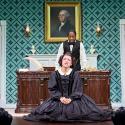



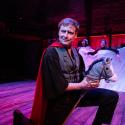

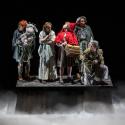
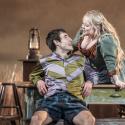

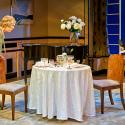
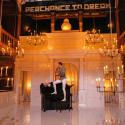
Add comment